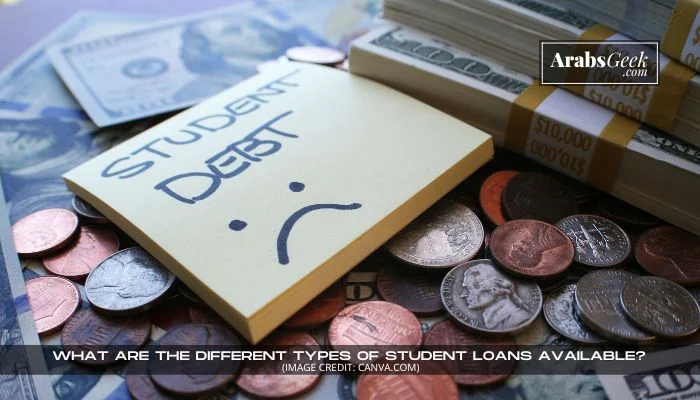What Are The Different Types Of Student Loans Available?: Navigating the world of student loans can often feel like exploring a labyrinth, with various pathways and choices at every turn. Understanding the different types of student loans available is a crucial step for students and families embarking on the journey of higher education. It’s not just about finding a way to fund your academic dreams; it’s about making informed decisions that will shape your financial future.
From federal loans, known for their security and borrower-friendly terms, to private loans that fill the gaps but come with their nuances, each type of loan serves a unique purpose in the realm of education financing. This exploration is essential, as the right student loan can be the key to unlocking educational opportunities without imposing a heavy financial burden post-graduation. As we delve into the landscape of student loans, our goal is to demystify these financial tools, empowering you with knowledge and confidence.
Understanding the different types of student loans is more than a financial exercise; it’s a strategic step towards achieving your educational goals with a plan that suits your personal financial situation.
Table of Contents
Federal Student Loans | What Are The Different Types Of Student Loans Available?
Federal student loans are funded by the U.S. government and are often the first choice for many students due to their favorable terms and conditions.
- Direct Subsidized Loans: These loans are available to undergraduate students with demonstrated financial need. The government pays the interest while you’re in school and during deferment periods.
- Direct Unsubsidized Loans: Unlike subsidized loans, these are available to both undergraduate and graduate students and are not based on financial need. Interest accumulates during all periods.
- Direct PLUS Loans: These are available to graduate or professional students (Grad PLUS loans) and parents of dependent undergraduate students (Parent PLUS loans). They require a credit check and have higher interest rates compared to subsidized and unsubsidized loans.
- Direct Consolidation Loans: This option allows you to combine multiple federal student loans into one, simplifying the repayment process.
- Unlock Exclusive Financial Insights! Click Over to EntrepreneursPilot.com Now!
- Unlock a Treasure Trove of Must-Read Finance Articles! Click Here to Dive into Our Homepage’s Wealth of Knowledge!
- Unlock Exclusive Business Opportunities! 🚀 Connect with Us Now at [email protected]!
Private Student Loans | What Are The Different Types Of Student Loans Available?
Private student loans are offered by banks, credit unions, and other financial institutions. They are typically used when federal loans, scholarships, and grants are insufficient to cover the total cost of education.
- Credit-Based: Unlike most federal loans, private loans often require a credit check. A good credit score or a co-signer can help secure a lower interest rate.
- Variable Interest Rates: Private loans may have variable interest rates, which can change over time, potentially making them more expensive in the long run.
- Flexible Borrowing Limits: Private loans often allow you to borrow up to the total cost of attendance, minus other financial aid received.
State Loans | What Are The Different Types Of Student Loans Available?
Some state governments offer student loans with terms similar to federal loans. These loans are often restricted to residents or students attending college in that state.
- State-Specific Terms: Interest rates and terms vary by state and may offer unique benefits or forgiveness programs.
- Limited Availability: Not all states offer student loan programs, and some may have limited funding.
Institution Loans
Certain colleges and universities offer their own loans to students. These institutional loans can have different terms and conditions, which are set by the school.
- Need-Based: Often, these loans are offered to students with financial need and may have lower interest rates.
- Limited Funds: Availability may be limited and typically covers a small portion of the total education costs.
Specialty Loans | What Are The Different Types Of Student Loans Available?
These loans are designed for specific fields of study or categories of students and might come with particular requirements or benefits.
- Health Profession Loans: For students pursuing degrees in health-related fields, often with favorable terms.
- Loans for Disadvantaged Students: Aimed at providing financial assistance to students from disadvantaged backgrounds.
Loan Repayment and Forgiveness Programs
- Income-Driven Repayment Plans: Available for federal student loans, these plans base your monthly payments on your income.
- Public Service Loan Forgiveness (PSLF): Offers loan forgiveness for federal student loan borrowers who work in public service jobs for a certain number of years.
- Teacher Loan Forgiveness: Available to teachers who work in low-income schools and meet other qualifications.
Conclusion | What Are The Different Types Of Student Loans Available?
Navigating the various types of student loans requires careful consideration of your financial needs, academic goals, and future repayment capacity. Understanding the differences between federal, private, state, and institutional loans, as well as available repayment and forgiveness options, is crucial in making informed borrowing decisions. By choosing the right type of loan, students can invest in their education while managing their financial obligations effectively post-graduation.
FAQ Section | What Are The Different Types Of Student Loans Available?
Q1: Should I choose federal or private student loans?
A: Federal student loans are generally recommended due to their fixed interest rates and flexible repayment options. Consider private loans if additional funding is needed after maximizing federal aid.
Q2: How important is credit when applying for student loans?
A: Credit is crucial for private student loans and Parent PLUS loans. A good credit score can lead to better interest rates, while a poor score might require a co-signer.
Q3: Can I combine different types of loans?
A: You can consolidate multiple federal student loans into a single Direct Consolidation Loan. However, private loans cannot be consolidated with federal loans.
Q4: Are there student loans for international students?
A: International students may be eligible for private student loans with a creditworthy U.S. co-signer and for institutional loans from some universities.











